FULL ORCHESTRA
Summer in the Citrus Groves (3/31/20) for full orchestra (2+1, 2+1, 2+1, 2 – 4, 3, 3, 1 – timp, 4 perc., strings) – 2’45”.
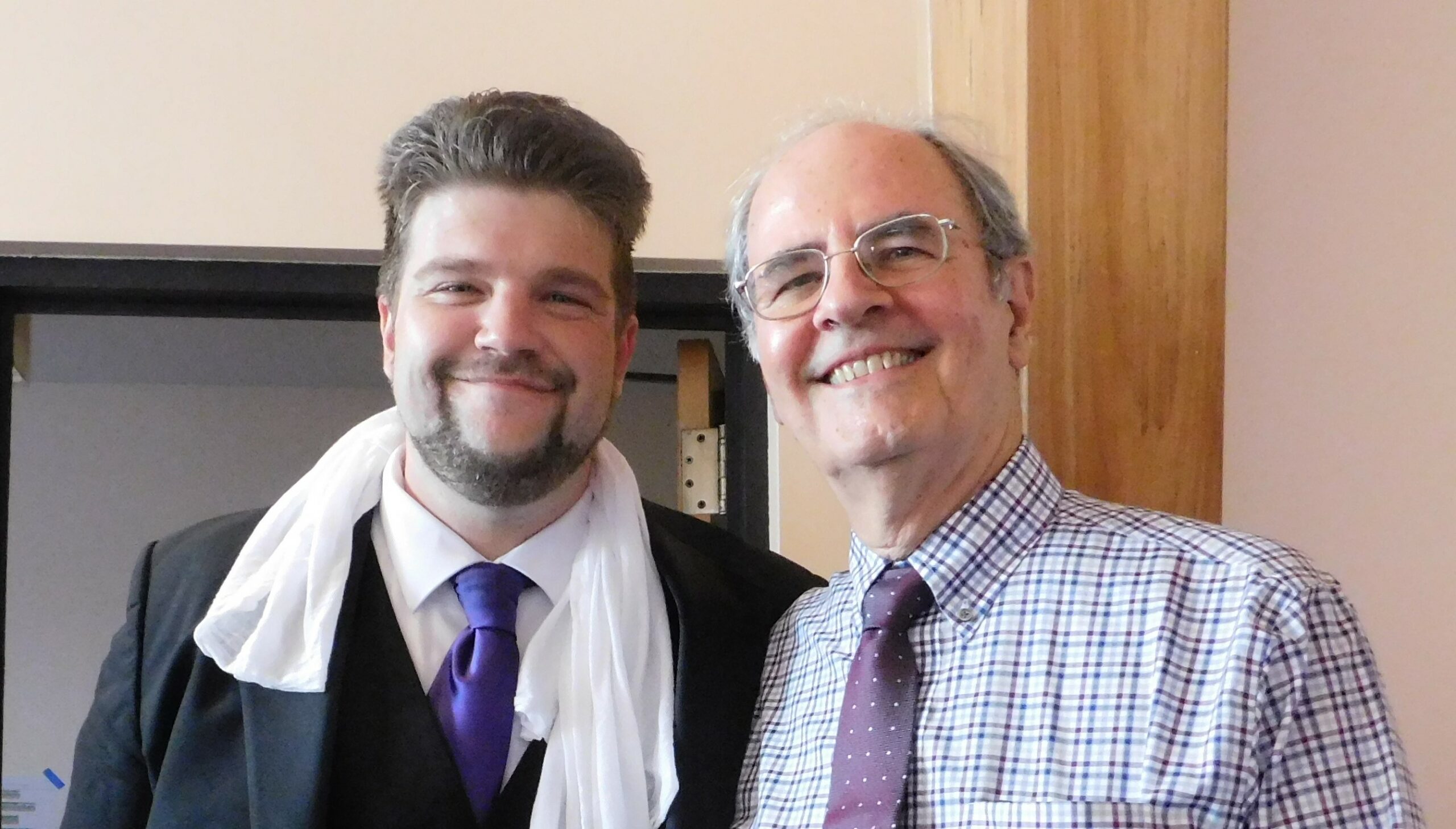
Aaron Collins and I
A Florida Story (10/11/19) for narrator and full orchestra [2+1, 2+1, 2+1, 2 – 4, 3, 3, 1 – timp, 4 perc, Strings] – 35’00”. Sean Sexton narrates the love story of his grandparents, Waldo and Elsebeth Sexton, in Waldo’s own words. The performance is by the Space Coast Symphony Orchestra, Aaron Collins, director. Waldo was a farmer, a business owner and one of the founders of Vero Beach and co-founder of McKee Botanical Gardens. The movements are: 1) A Letter from a Founding Father, 2) Missives, 3) Dreams, 4) Trials, 5) Fruits of Labor and Love, and 6) In Retrospect.
Live performance. The work was premiered by the Space Coast Symphony Orchestra Aaron Collins, director, on April 23, 2022, at 3:00 pm at at Eau Gallie High School Performing Arts Center, 1400 Commodore Boulevard in Melbourne, and on April 24 at 3:00 PM, at the Waxlax Center for the Performing Arts, 1895 St Edwards Drive in Vero Beach.
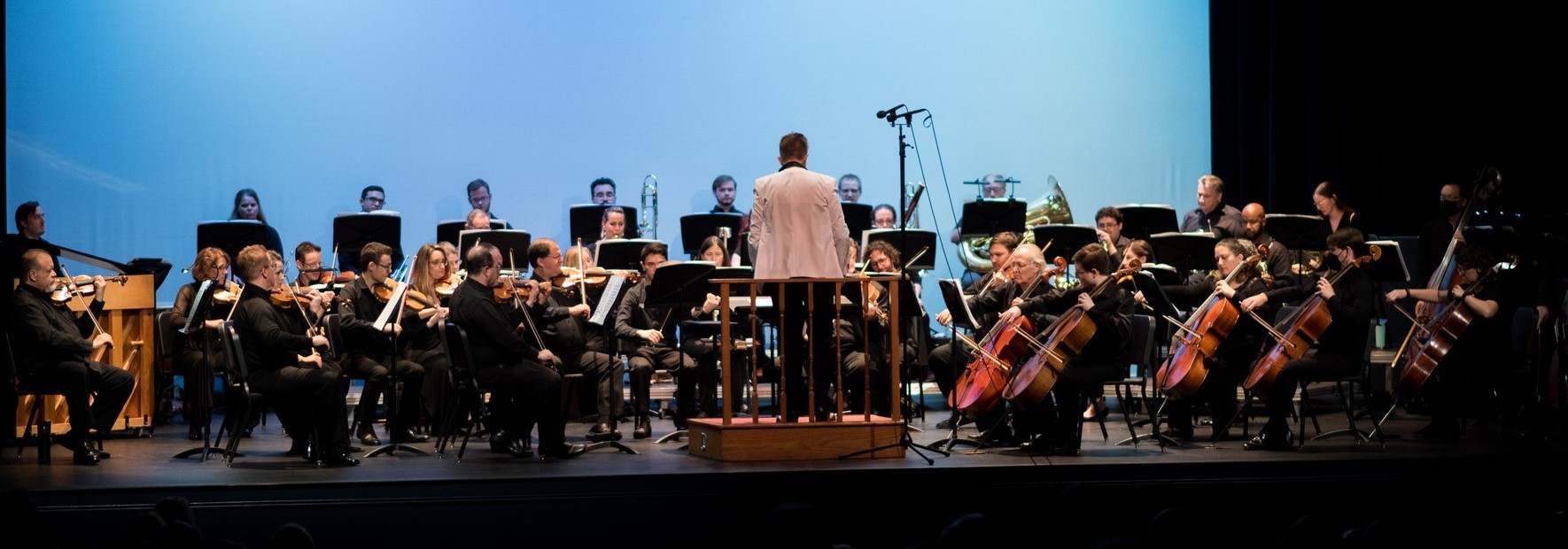
Space Coast Symphony Orchestra, Aaron Collins, Director
Fanfare for a Windy City (8/2/19) for orchestra [2 2 2 2, 4 2 3 1, timp, 2 perc, strings] – 3’25”. This fanfare captures the grandeur and majesty of Chicago, the Monster of the Midway, the great city on the south shore of Lake Michigan. It begins with a call to attention from the horns answered by rising brass and by rustling breezes from the woodwinds and strings. Tension builds to the timpani solo that suggests both strength and restlessness, hallmarks of a dynamic city. The timpani theme is taken up by various instrumental choirs while the lower brass provide a dark counterpoint. The music relaxes. The middle section suggests gentle winds over calm waters on Lake Michigan – a beautiful summer day. But tensions build again, the timpani solo returns, and the dark and restless themes develop, now with winds aloft provided by the strings and woodwinds. The fanfare reaches a climax, but the last few measures provide resolution. The final rallentando over the timpani’s theme pronounces the power of the great city. MIDI Recording.
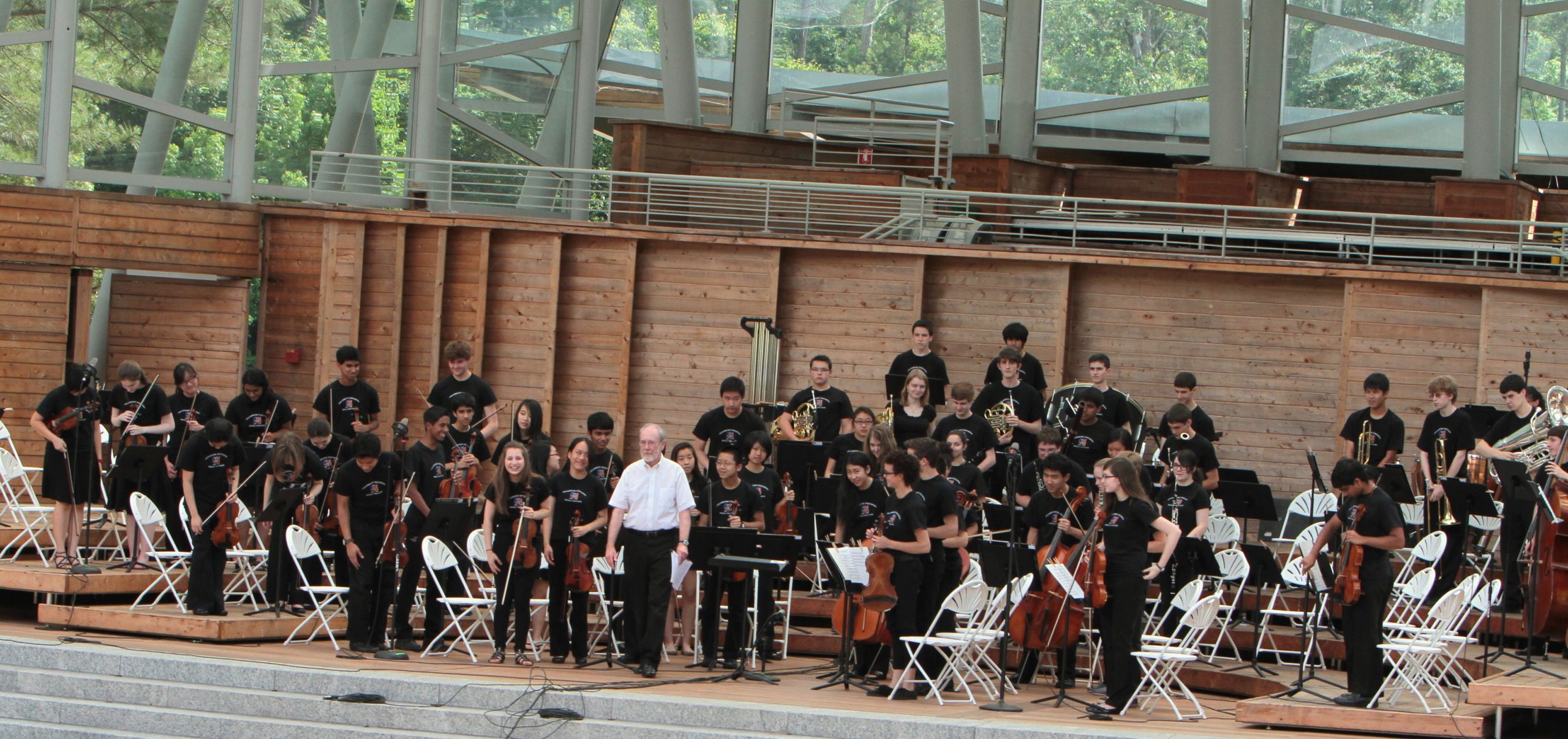 The Triangle Youth Philharmonic, Hugh Partridge, conductor
The Triangle Youth Philharmonic, Hugh Partridge, conductor
Celebration Overture (9/21/17) for orchestra [2+1 2+1 2 2, 4 3 3 1, timp, 3 perc, harp, strings]. The growth of an institution is a wonderful thing to observe. This work celebrates the work of the dedicated student musicians, board members of The Philharmonic Society, and the multiple conductors who have made the Triangle Youth Philharmonic and its associate orchestras what they are today. Special credit goes to Hugh Partridge, conductor of the orchestra since its inception, and to Margaret Partridge as the Executive Director of The Philharmonic Society. I have known Hugh since well before the founding of this orchestra and appreciate his both his friendship and his support of new music. My congratulations to all those whose work led to this celebration of thirty years of the Triangle Youth Philharmonic. The work itself is in three parts – a fanfare, a lyric melody that repeats with added rhythmic emphasis, and a rousing finale. All of the themes relate to the timpani solo found in the fanfare.
Live performance. The work was commissioned by The Philharmonic Society, Raleigh, NC,and premiered by the Triangle Youth Philharmonic, Hugh Partridge, Director, on April 22, 2018. The piece was repeated by them on a concert at the Koka Booth Amphitheatre in Cary, NC on June 3, 2018 – 7’00”
Chasing Spirits (8/12/15) for orchestra [2+1 2 2 2, 4 3 3 1, timp, 2 perc, strings] – 6’50. MIDI Recording.
Kaleidoscope (7/24/14) for orchestra [2+1 2 2, 2 2 3 1, timp, 2 perc, strings] – 13’00”. The traditional kaleidoscope uses a tube with mirrors and rotating bits of glass to create an everchanging set of symmetrical images. These are images based on the bits of glass and nothing more: economy of means producing a wealth of images. This composition uses several thematic ideas (its stones, so to speak) that are rotated in and out of the work in varied or changing patterns to create a variety of moods and perceptions. The dark, opening material gives way to rolling triplets and a dignified French horn solo. Musical elements are mixed, rhythmic pace and activity are increased, and themes are transformed. Eventually, the pace slackens, and the opening material returns in a spun-out version for double reeds. The kaleidoscopic sounds have come full circle. MIDI Recording.
Aurora Borealis (2012) for orchestra [2 2 2 2, 4 2 2 1, timp, 3 perc, strings] – 8’10”. However strange the Northern Lights may seem, their appearance is wonderous. The work begins with motives by the oboe and clarinet above pulsing strings that convey a sense of cheerful mystery. The underlying brass and percussion add to the sense of wonder. Calming melodic ideas interrupt the pulsing to remind us that the vision we see is both peaceful and comforting. MIDI Recording.
The Italian Sojourn (2012) for orchestra [3 3 2 2, 4 3 3 1, perc, strings] – 7’25”. The Italian Sojourn is based largely on memories of a stay near Florence, Italy, in 1975. I was staying with friends in a villa in the hills about five miles from the city. We were young and it was the first time in a foreign country. Everything was an adventure, whether it was searching for portabella mushrooms in the forest, visiting the Uffizi Gallery or buying bread and cheese in the open market. This piece attempts to capture the joy of youth and adventure when every-thing was new and life appeared to have no limits. MIDI Recording.
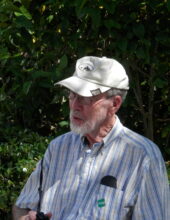
Ancient Voices (2010) for orchestra [4 3 5 4, 4 4 3 4, timp, 3 perc, strings]. The three movements of the work were inspired by quotes from famous men in the Roman Empire. Gaius Julius Caesar (12 July 100 BC – 15 March 44 BC) was a Roman general and statesman. A member of the First Triumvirate, Caesar led the Roman armies in the Gallic Wars before defeating Pompey in a civil war and governing the Roman Republic as a dictator from 49 BC until his assassination in 44 BC. He played a critical role in events that led to the demise of the Roman Republic and the rise of the Roman Empire. “The die is cast” reflects his decision to march on Rome and begin a civil war. Titus Lucretius Carus (c. 99 – c. 55 BC) was a Roman poet and philosopher. His only known work is the poem De rerum natura, about Epicureanism. Epicurus believed that the greatest good was to seek modest, sustainable pleasure. “The falling drops at last will wear the stone” reflects Lucretius’s knowledge of the world. Quintus Horatius Flaccus (8 December 65 – 27 November 8 BC), known in the English-speaking world as Horace, was the leading Roman lyric poet during the time of Augustus. Horace’s career coincided with Rome’s momentous change from a republic to an empire. “A contented mind confers it all” reflects Horace’s charm and grace.
Live performance. The work was commissioned by The Philharmonic Society, Raleigh, NC, premiered by the Triangle Youth Philharmonic, Hugh Partridge, Director, in Meymandi Hall, Raleigh, NC, on May 8, 2011– 20’00”.
I. The Die is Cast – Julius Caesar, II. The Falling Drop At Last Wear The Stone – Lucretius,
III. A Contented Mind Confers It All – Horace,
Homage (revised 2002) for orchestra [2 2 2 2, 4 2 3 1, timp, 3 perc, strings] – 20’00”. The work is partly a nod to Bach, but really a token of my love for my wife, Lorraine.
Live Performance. The work was commissioned by The Philharmonic Society, Raleigh, NC, premiered by the Triangle Youth Philharmonic, Hugh Partridge, Director, on November 23, 2003
Lambent Skies: Sunset Variations (2002) for orchestra [3/1 3/1 3/1 2, 4 3 2 1, timp, perc, strings] – 10’45”. MIDI Recording.
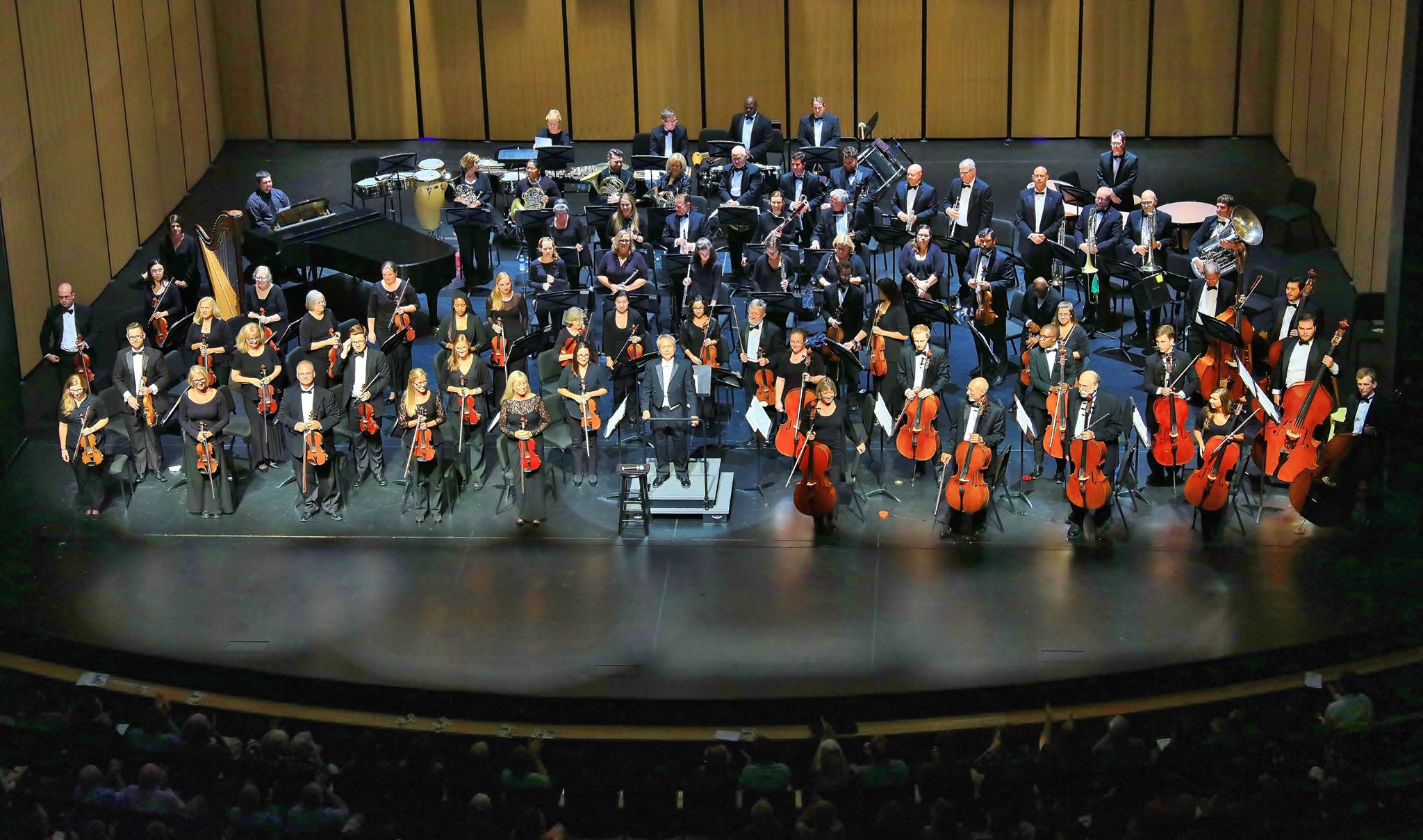
The Wilmington (NC) Symphony Orchestra, Steven Errante, director
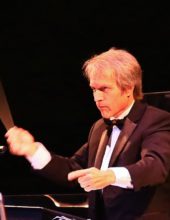
Sister Cities Overture (1994) for orchestra [2 2 3 2, 4 3 3 1, Timp, 3 Perc, Strings] written jointly for the Raleigh Youth Symphony Orchestra, Hugh Partridge, Director, and the Wilmington Symphony Orchestra, Steven Errante, Director. The work was commissioned to celebrate the Sister City relationship of Raleigh, North Carolina, and Hull, England.
Live performance. This recording was the one done by the Wilmington Symphony, Steven Errante, director.